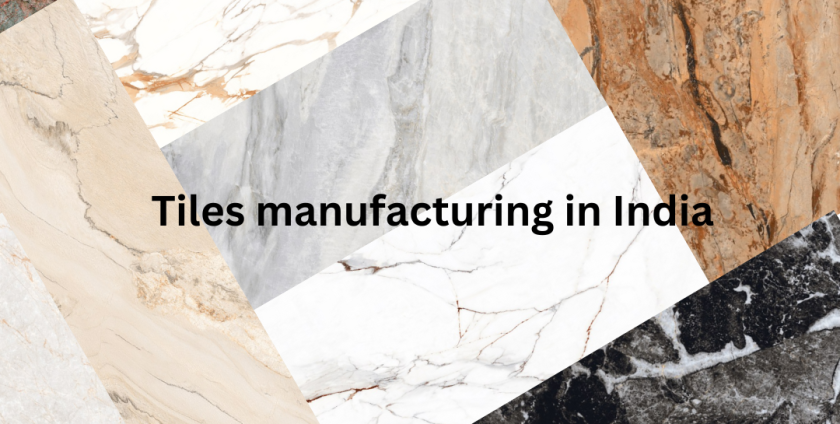
The Indian ceramic tiles manufacturing industry has grown significantly over the last few decades and has emerged as one of the major sectors within the country’s building and construction materials industry. Tiles are widely used in residential, commercial, and industrial applications and are made from materials such as ceramic, porcelain, vitrified, and natural stone. Rapid urbanization, increased demand for housing, and infrastructure development have played a major role in the growth of tile manufacturing in India.
1. Market Overview
- India is the second-largest and largest tile consumer and producer in the world. With a significant domestic market, India has also established itself as one of the key countries exporting tiles, primarily to destinations like the Middle East, Europe, and Africa. The increasing demand for both decorative and highly durable flooring and wall applications in the residential and commercial sectors has been propelling the market.
2. Types of Tiles Manufactured in India
- Indian tiles industry manufactures various tiles to cater to different consumer preferences and market requirements. Some of the common types include the following:
- Ceramic Tiles: These are the most common type of tiles, made from clay and fired at high temperatures. They are affordable, durable, and come in a wide range of designs.
Porcelain tiles are relatively stiffer, stronger, and relatively tougher and water-resistant when comparing ceramic. They are utilized as an item to form both flooring &wall purposes.
Vitrified strong and less in pores which makes them better than some options from the other product which were there in the building markets. They are processed using an assortment of ingredients at elevated temperatures by subjecting a heated mixture of clays/silica/fender.
Glass Tiles: These tiles are mainly used for aesthetic purposes in bathrooms, kitchens, and other decorative areas. They are made from glass.
Natural Stone Tiles: Those tiles are made from natural stones like marble, granite, and slate. They are used for luxury applications.
3. Production Process
- The manufacturing process of tiles generally involves the following steps:
- Preparation of Raw Materials: Raw materials like clay, kaolin, silica, feldspar, and other minerals are sourced and prepared.
Forming: The raw materials are mixed into a slurry, which is then formed into the desired tile shape using different methods, such as pressing or extrusion.
Firing: The formed tiles are fired at temperatures ranging from 1000°C to 1400°C in kilns, which harden and give the tiles their desired characteristics.
Glazing: Many tiles undergo a glazing process where a ceramic coating is applied to create smooth, glossy surfaces.
Packaging and Distribution: Once the tiles are cooled, inspected, and tested for quality, they are packed and distributed to retailers, wholesalers, and customers.
4. Growth Drivers
- The tiles manufacturing industry in India has been spurred by several factors:
- Urbanization and Infrastructure Development: With rapid urban growth and increasing demand for residential, commercial, and industrial spaces, there has been a surge in the demand for tiles.
Growing Disposable Incomes: With the increase in the purchasing power of the Indian middle class, there is an increase in demand for tiles that are aesthetically pleasing and durable.
Government Policies: Schemes such as Housing for All, Smart Cities, and Atal Mission for Rejuvenation and Urban Transformation (AMRUT) are really providing a boost to the construction and building materials industries, such as tiles manufacturing.
Export Possibilities: Indian tiles companies have gained an aggressive stand on the international markets; with growth opportunities in Europe, Africa, and the Middle East, higher overseas demand for quality tile supplies triggers demand to generate further.
5. Obstacles
- Though the industry in India is developing a robust stance in manufacturing Indian tiles, it faces quite some obstructions in its way;
- Raw Material Dependence- several producers rely on the input from foreign lands making its cost fluctuation probable while disturbing the supply line occasionally.
Environmental Issues: Tile manufacturing is an energy-intensive and environmentally polluting activity. Tighter rules on carbon emission and waste handling might affect the manufacturing processes.
Competition: The Indian tiles industry is very competitive. International as well as local companies compete to gain market share.
Technology Advancements: Consumers’ preferences and tastes keep changing, so manufacturers must keep investing in new technologies, designs, and environmentally friendly techniques to remain in the game.
6. Future Outlook
- The Indian tiles manufacturing industry is expected to continue its growth. The demand for good quality and innovative tiles coupled with technological advancements will drive the sector’s expansion. With a push towards sustainable production and an increasing export market, Indian manufacturers are well-positioned to capture a significant share of the global market.
